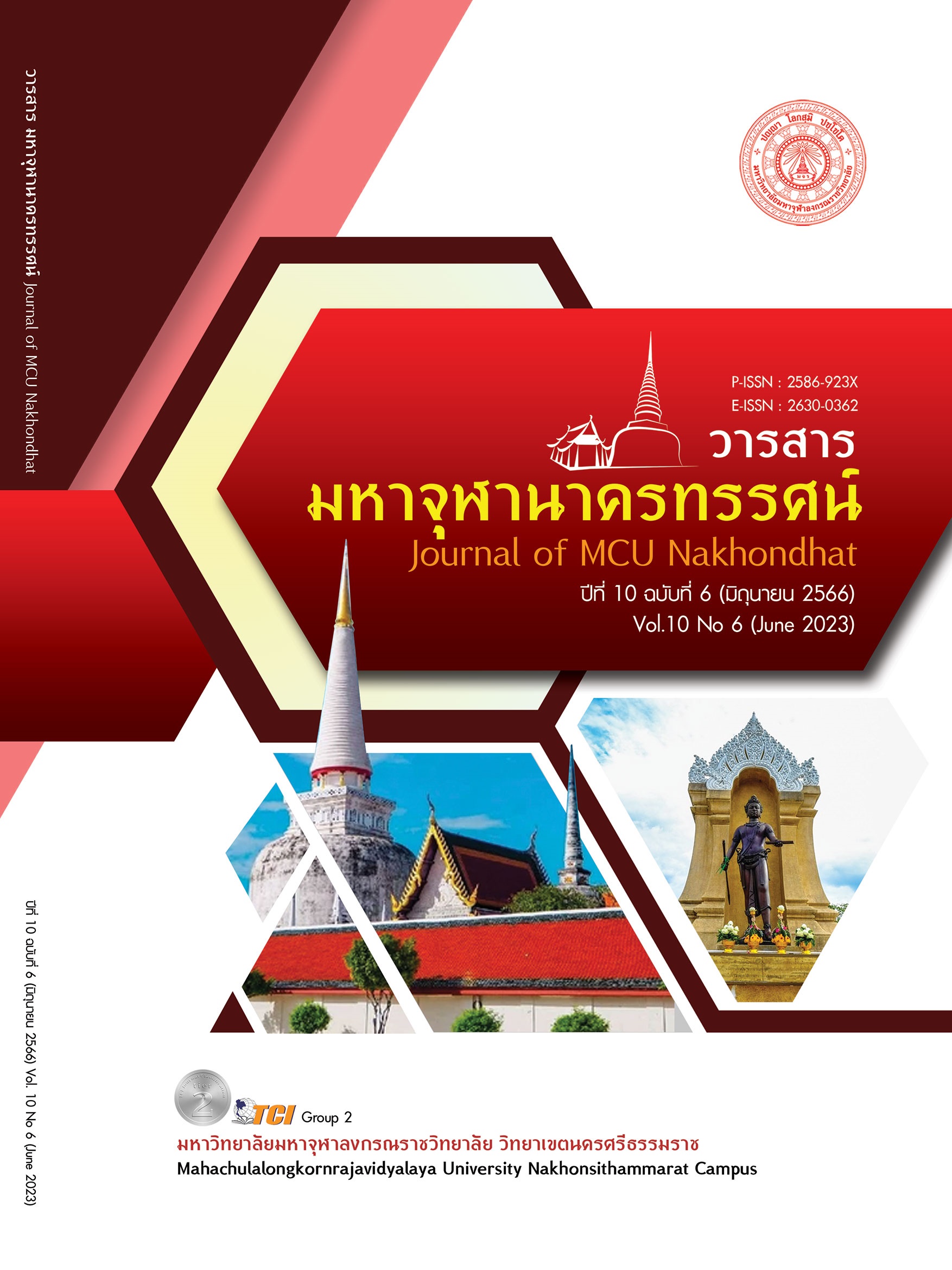INFLUENCE OF LEADER’S SENSE OF HUMOR AFFECTING THE RELATIONSHIP BETWEEN LEADERSHIP AND INNOVATIVE WORK BEHAVIOR: THAILAND POST COMPANY LIMITED
Main Article Content
Abstract
The purposes of this study were to study the influence of leader’s sense of humor on the relationship between transformational leadership and innovative work behavior of the divisions within Thailand Post Company. This study was quantitative research. The populations of this study were all 104 divisions. The samples of this study covered 104 divisions. The cluster sampling technique had been conducted within the divisions of Thailand Post Company. The research instrument was 6 rating scale questionnaires. Collecting data after launching of questionnaires to 104 divisions. Each division had got 8 questionnaires for the individual respondents. The responding from 100 divisions consisted of 799 in level of individual respondents. The statistics were frequency, percentage, min, max, mean, standard deviation and correlation coefficient. The hierarchical regression analysis was applied. The research results indicated that leader’s sense of humor had the significantly positive moderating effects on the relationship between transformational leadership and innovative work behavior. The division’s leaders of Thailand Post Company were prone to use sense of affiliate humor and self-enhancing humor. They were positive humor. Whereas aggressive humor that was negative humor. It was harm to other people. But it could promote the one who used itself. Aggressive humor had not the relationship with transformational leadership and innovative work behavior. It was also found that the use of self-defeat humor. It could be harm to the one who used itself. But it could promote the relationship with other people. It was not appropriate with the leaders who had transformational leadership.
Article Details

This work is licensed under a Creative Commons Attribution-NonCommercial-NoDerivatives 4.0 International License.
References
บริษัท ไปรษณีย์ไทย จำกัด. (2565). รายงานประจำปี 2564. บริษัท ไปรษณีย์ไทย จำกัด. เรียกใช้เมื่อ 15 มกราคม 2565 จาก https://file.thailandpost.com/upload/ content /2564_63355f0830859.pdf
AlMulhim, A. F. (2020). Linking Knowledge Sharing to Innovative Work Behavior: The Role of Psychological Empowerment. Journal of Asian Finance, Economics and Business, 7(9), 549-560.
Arendt, L. (2009). Transformational Leadership and Follower Creativity: The Moderating Effect of Leader Humor. Review of Business Research, 9(4), 100-106.
Avolio, B. J. et al. (1999). A Funny Thing Happened on the Way to the Bottom Line: Humor as a Moderator of Leadership Style Effects. Academy of Management Journal, 42(2), 219-227.
Basu, R. & Green, S. G. (1997). Leader-Member Exchange and Transformational Leadership: An Empirical Examination of Innovative Behaviors in Leader-member Dyads. Journal of Applied Social Psychology, 27(6), 477-499.
Clouse, R. W. & Spurgeon, K. L. (1995). Corporate Analysis of Humor. Psychology: A Journal of Human Behavior, 32(3-4), 1-24.
Cohen, J. (1998). Statistical Power Analysis for the Behavioral Sciences. (2nd ed.). Hillsdale, NJ: Lawrence Erlbaum Associates, Publishers.
Conger, J. A. (1989). The Charismatic Leader: Behind the Mystique of Exceptional Leadership. San Francisgo, CA: Jossey-Bass.
Craumer, M. (2002). Getting Serious about Workplace Humor. Harvard Management Communication Letter, 5(7), 3-4.
Csikszentmihalyi, M. (1997). Creativity: Flow and the Psychology of Discovery and Invention. New York, NY: Harper Collins Publishers.
Davis, A., & Kleiner, B. H. (1989). The Value of Humour in Effective Leadership. Leadership & Organization Development Journal, 10(1), 1-3.
De Jong, J. & Den Hartog, D. (2010). Measuring Innovative Work Behaviour. Creativity and Innovation Management, 19(1), 23-36.
Denti, L. & Hemlin, S. (2012). Leadership and Innovation in Organizations: A Systematic Review of Factors that Mediate or Moderate the Relationship. International journal of Innovation Management, 16(3), 1-20.
Dienstbier, R. A. (1995). The Impact of Humor on Energy, Tension, Task Choices, and Attributions: Exploring Hypotheses from Toughness Theory. Motivation and Emotion, 19(4), 255–267.
Dixon, N. F. (1980). Humor: A Cognitive Alternative to Stress? In I. G. Sarason & C. D. Spielburger (Eds.). Stress and Anxiety, 7(1980), 281-289.
Dubinsky et al. (1995). An Examination of Linkages between Personal Characteristics and Dimensions of Transformational Leadership. Journal of Business and Psychology, 9(3), 315-335.
Duncan, W.J. (1982). Humor in Management: Prospects for Administrative Practice and Research. Academy of Management Review, 7(1), 136-142.
Gifford W. et al. (2011). Developing Team Leadership to Facilitate Guideline Utilization: Planning and Evaluating a 3-Month Intervention Strategy. Journal of Nursing Management, 19(1), 121-132.
Gruner, C.R. (1997). The Game of Humor: A Comprehensive Theory of Why We Laugh. New Brunswick, NJ: Transaction.
Ho, L.H. et al. (2011). Influence of Humorous Leadership at Workplace on the Innovative Behavior of Leaders and their Leadership Effectiveness. African Journal of Business Management, 5(16), 6674-6683.
IMD. (2022). IMD World Talent Ranking 2022. Retrieved March 20, 2023, from https://imd.cld.bz/IMD-World-Talent-Ranking-2022
Kenny, D.A. (2018). Moderation. เรียกใช้เมื่อ 20 March 2023 จาก http://davidakenny.net/cm/moderation.htm
Kerr, S. & Jermier, J. M. (1978). Substitutes for Leadership: Their Meaning and Measurement. Organizational Behavior and Human Performance, 22(3), 375-403.
Kock, N. & Lynn, G.S. (2012). Lateral Collinearity and Misleading Results in Variance-Based SEM: An Illustration and Recommendations. Journal of the Association for Information Systems, 13(7), 546-580.
Kock, N. (2015). Common method bias in PLS-SEM: A Full Collinearity Assessment Approach. International Journal of e-Collaboration, 11(4), 1-10.
Malone, P. B. (1980). Humor: A Double-Edged Tool for Today's Managers. Academy of Management Review, 5(3), 357-360.
Martin, R. A. & Lefcourt, H. M. (1983). Sense of Humor as a Moderator of the Relation between Stressors and Moods. Journal of Personality and Social Psychology, 45(6), 1313-1324.
Martin, R. A. et al. (2003). Individual Differences in Uses of Humor and their Relation to Psychological Well-Being: Development of the Humor Styles Questionnaire. Journal of Research in Personality, 37(1), 48-75.
Romero, E.J. & Cruthirds, K.W. (2006). The Use of Humor in the Workplace. The Academy of Management Perspectives, 20(2), 58-69.
Ziv, A., & Gadish, O. (1990). The disinhibiting effects of humor: Aggressive and Affective Responses. Humor: International Journal of Humor Research, 3(3), 247-257.


